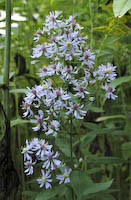 |
|
 |
 |
Heart-leaved Aster
Symphyotrichum cordifolium
(formerly Aster cordifolius) |
 Other common names:
Blue Wood Aster, Common Blue Wood Aster Other common names:
Blue Wood Aster, Common Blue Wood Aster

Other scientific names:
Aster cordifolius, Aster choralis, Aster finkii, Aster lowrieanus, Aster plumarius, Aster sagittifolius, Symphyotrichum sagittifolium

French names:
Aster à feuilles cordées

Family:
Composite Family (Asteraceae)

Group:
Asters

Distinctive features:
Heart-shaped leaves. Flowers in a dense rounded panicle (ie, not flat-topped).

Similar species:
•
Azure Aster (Symphyotrichum oolentangiense) - leaves of this species are in between Arrow-leaved Aster and Heart-leaved Aster.
•
Arrow-leaved Aster (Symphyotrichum urophyllum) - leaves not deeply cleft at all.
•
Large-leaved Aster (Eurybia macrophylla) - leaves much larger, not as deeply cleft. Flowers in a flat-topped head, usually white.

Flowers:
Summer, Autumn; Blue/Violet; 7 or more parts (petals); 1.5cm in diameter. Ray flowers: 8-15, pale blue, blue-violet, rose, or mauve; sometimes white. Disc flowers: 14-20, yellow becoming purple. Flowers are arranged in a rounded panicle in dense clusters.

Leaves:
Alternate, Simple, Toothed; Basal leaves are heart-shaped, with a very deep cleft at the base of the leaf. Upper stem leaves are still somewhat heart-shaped, but without a deep cleft, or have a much shallower cleft - resemble leaves of Arrow-leaved Aster (Symphyotrichum urophyllum). Conspicuously & jaggedly toothed.

Height:
60-90 cm (23-35 in)

Stem:
Smooth, many-branched.

Habitat:
Forests, Fields and Open Areas; Open woods and edges of woods.

Grows in Sun/Shade:
Shade

Lifespan:
Perennial.

Books:
Newcomb's Wildflower Guide: 454
Peterson's Field Guide to Wildflowers: 354

Native/Non-native:
Native

Status:
Common.

Notes:
This is a fairly easy Aster to identify, and is fairly common. The leaves are distinctive, but they may be confused with the similar species listed above.

For more information visit:
Ontario Wildflowers

Photographs:
148 photographs available, of which 11 are featured on this page. SCROLL DOWN FOR PHOTOGRAPHS.

 |
 |
|
|
|
|
|
|
|  |
|